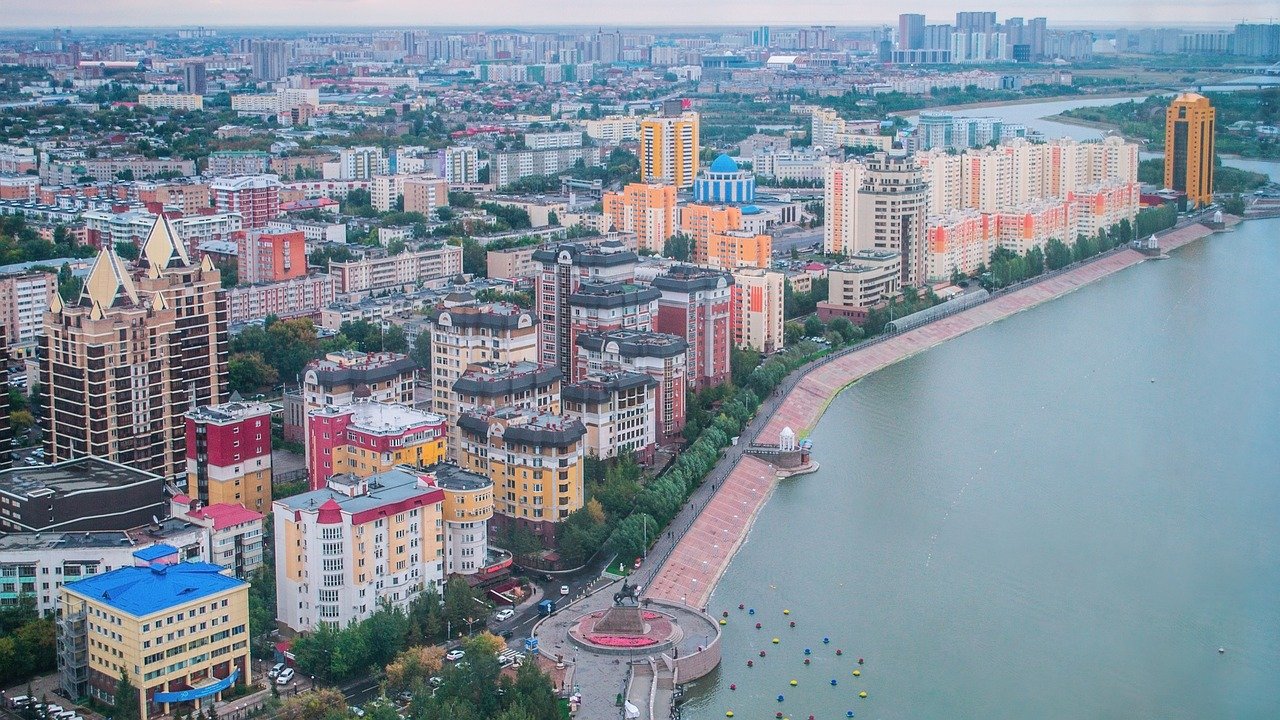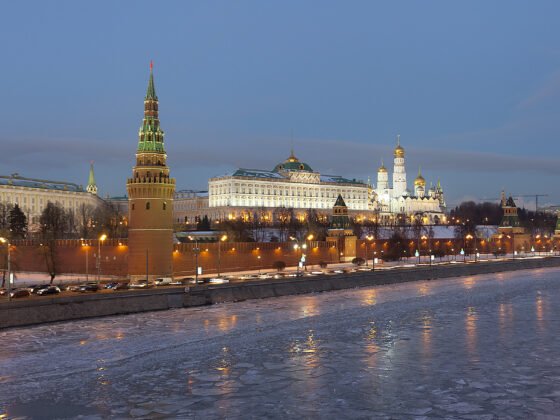Since the beginning of the war, Kazakhstan has made a concerted effort to enhance its partnerships with the countries located across the Caspian Sea (Azerbaijan and Georgia) and further to the west (Turkey and European countries). Together, they are developing the Trans-Caspian International Transport Route (TITR), also known as the Middle Corridor. The goal of this megaproject is to establish a multimodal trade and transport corridor connecting Southeast Asia, China, Central Asia, the South Caucasus, Turkey, and Europe. In addition to these efforts to improve connectivity by building “hard” infrastructure and enhancing “soft” infrastructure, Kazakhstan is fostering political and security cooperation with Azerbaijan and Turkey.
Kazakhstan’s new push to the West has the potential to have substantial implications not only for the country’s own national security, but also for the changing geopolitical scene in Eurasia. If the Middle Corridor is successful, the country will be less dependent on Russia; it will be able to realize its potential as a trans-continental transport hub; and it will enjoy diversified and strong relations with the countries of the South Caucasus, Turkey, and Europe. The consolidation of the “Turkic belt” around the Ankara-Baku-Astana-Tashkent axis will enhance Kazakhstan’s ability to withstand Russian pressure, which is likely to grow in intensity and toughness in the coming years.
Looking West
Since the dawn of independence, Kazakhstan has been looking west with great hope and enthusiasm. The country’s cultural affinity with Azerbaijan and Turkey has helped Astana to pursue various political and economic interests. These two Turkic countries and Georgia formed the trans-Caspian transport corridor connecting Kazakhstan to Europe and its lucrative markets. The strategic importance of the westbound route came from the fact that it provided an alternative to the northern one via Russia.
Over the years, Kazakhstan has engaged in multilateral programs and projects and invested in infrastructure projects (ports, terminals, roads, railways, and pipelines) linking it to its western partners. In the 1990s, it became a member of the EU-funded Transport Corridor Europe-Caucasus-Central Asia (TRACECA) program aimed at the “revival of the Silk Road.” When the need arose to develop export routes for Kazakhstan’s oil, it set up the national shipping company KazMorTransFlot and started building terminals in the port cities of Aktau and Kuryk. In 2006, Kazakhstan joined the Baku-Tbilisi-Ceyhan oil pipeline project. New revenue streams allowed the national oil and gas company KazMunaiGaz (KMG) to expand its reach, acquiring Rompetrol, a Romanian oil refiner and owner of a chain of petrol stations across Europe, in 2007 and the Batumi port and oil terminal in Georgia in 2008.[1]
Kazakhstan’s western pivot cannot be explained solely by the appeal of lucrative European markets. Similar to Turkey, the country has a strong Eurasian identity. Deepening relations with Europe is at the core of its state-building project. The idea that Kazakhstan is the bridge between the east and the west guides national strategies and policies. Its openness and readiness to connect and expand contrasts with the isolationist and autarkic stance of Turkmenistan, which has not been won over by the attraction of European markets.
Prior to the war in Ukraine, the Russian factor both constrained and incentivized trans-Caspian connectivity projects, but it was not always decisive. While Moscow was ultimately successful at blocking the development of the trans-Caspian gas pipeline, it is possible to imagine a different outcome had Turkmenistan been more strategic and proactive. In 2007, when Russia did not want to enlarge the capacity of the Caspian Pipeline Consortium (CPC) pipeline in order to pump growing volumes of Kazakh oil from the giant Tengiz field to the Russian port of Novorossiisk, KMG and its partners decided to set up the Kazakhstan Caspian Transport System and transport hydrocarbons by large-capacity tankers. Three acquired tankers were, however, eventually sold after the CPC pipeline was enlarged and companies stopped contracting with the KCTS. The more economical option won the day.
In the Wake of the War
Russia’s war against Ukraine has heightened the strategic importance of the Caspian route. During 2022, the work of the CPC pipeline, which carried around 80 percent of Kazakhstan’s oil exports, was disrupted four times. In July of that year, President Kassym-Jomart Tokayev instructed KMG to prioritize the trans-Caspian corridor. In 2023, KMG formed a strategic partnership with Abu Dhabi Ports Group to develop maritime and coastal cargo transportation, and tanker and merchant fleet in the Caspian region. The joint venture has acquired two tankers to cross the Caspian Sea and is planning to expand the fleet in the Caspian and the open seas.
These efforts to develop oil cargo are part of the Trans-Caspian International Transport Route (TITR), or Middle Corridor, megaproject. Its goal is to develop a multimodal trade and transport route connecting Southeast Asia, China, Central Asia, the South Caucasus, Turkey, and Europe. The TITR began to develop in 2013 on the initiative of Turkey, building on the earlier work of the EU-funded TRACECA program, the Asian Development Bank Central Asia Regional Economic Cooperation (CAREC) program, and China’s Belt and Road Initiative.
The route increased dramatically in popularity in 2020-2021, with a 52-percent rise in cargo traffic due to the COVID-19 pandemic and disruptions to sea cargo. The war in Ukraine has given a further significant boost to the project, enhancing its strategic importance for the countries along the route.
Over the past two and a half years, there has been a flurry of activities aimed at developing infrastructure, aligning regulations, and reducing tariffs along the route. In 2022, Kazakhstan signed roadmaps with Azerbaijan, Georgia, and Turkey to address bottlenecks and develop the Middle Corridor by 2027. In 2023, the national railway companies of Kazakhstan, Azerbaijan, and Georgia created a joint venture to develop multimodal service. In 2024, Kazakhstan’s parliament ratified a bilateral agreement with Turkey that introduced a unified digital document for railway and maritime cargo, a move that has reduced transit times between the two countries from 15 to five days.
Kazakhstan and Azerbaijan are also building a fiber-optic cable along the Caspian seabed. This is part of the Digital Silk Way project, spearheaded by Azerbaijan’s telecommunications operator AzerTelekom and aimed at creating a digital corridor between Europe and Asia. The cable project is not new, and it was supposed to be completed by 2021. However, prior to the war, its implementation had stalled, since it was hard to find investors in this technologically difficult and expensive project that simply supplemented the capacity of existing land cables via Russia and China. Today, by contrast, the cable’s price is perceived worth paying to hopefully ensure the security of digital infrastructure.
Importantly, the war increased the importance of the Middle Corridor to major international actors, chief among them the European Union. In 2019, the EU made enhancing transport, energy, and digital connectivity a priority in its relations with Central Asia. The bloc sought to make its own global infrastructure development push (the Global Gateway Initiative) to rival China’s Belt and Road Initiative. In light of Europe’s more recent decoupling from Russia and de-risking from China, the Caspian transport corridor is now perceived as useful for the strategic autonomy of the union, fostering EU willingness to invest in the corridor. In 2023, the European Bank for Reconstruction and Development (EBRD) released a study on sustainable transport connectivity between Europe and Central Asia commissioned by the EU, which identified 33 hard infrastructure initiatives and seven soft connectivity actions. And in January 2024, Brussels hosted a big Investors Forum at which European and international financial institutions committed €10 billion in support and investments to sustainable transport connectivity in Central Asia.
Changing Balance of Power in the Caspian Region
Shifts in connectivity are indicative of the ongoing shift in the regional power balance. Focused on the war with Ukraine, Russia has been losing its position as a power broker and security provider in the South Caucasus. It has taken a hands-off approach in the Armenia-Azerbaijan conflict, including standing aside in 2023 when Azerbaijan launched a military attack on Moscow’s ally Armenia that ended with Azerbaijan taking control over Nagorno-Karabakh. A few months later, in April 2024, Russian peacekeepers left Karabakh entirely. Having regained its territorial integrity, Azerbaijan emerged as a formidable regional power that combined military capacity, economic muscle, and strong partnerships. Indeed, comprehensive support from Turkey played a crucial role in Azerbaijan’s success in Nagorno-Karabakh, with the result that the victory buoyed the confidence not only of Baku, but also of Ankara.
Turkey’s skillful handling of the Russia-Ukraine war has likewise raised the country’s international profile. Ankara has been able to maintain relations with all the parties: Russia, Ukraine, and the West. In 2022, Turkey hosted peace negotiations and brokered the Black Sea grain deal that allowed the safe passage of grain from Ukrainian ports. The successful use of Turkish Bayraktar drones during the initial stage of the war raised the prestige of the country’s military-industrial complex.
For its part, Kazakhstan must welcome the enhanced profile of these two brotherly Turkic nations, with whom it has enjoyed special relations from the first days of independence. In May 2022, Tokayev visited Ankara and signed a Joint Statement on Enhanced Strategic Partnership and a number of agreements. The parties agreed to produce Turkey’s Anka drones in Kazakhstan and to develop military intelligence cooperation. In August of that year, Tokayev visited Baku and signed the Declaration on Strengthening Strategic Relations and Deepening Allied Cooperation between Azerbaijan and Kazakhstan. The three countries have been working to develop their cooperation in the spheres of politics, trade, economics, transit and transport, energy, agriculture, and culture and humanitarianism.
Kazakhstan’s desire for deeper partnerships with Turkey and Azerbaijan can draw not merely on shared interests (which have only grown with the war), but also on favorable public opinion. According to survey data from the Central Asia Barometer, in November-December 2022, 31 percent of Kazakhstani respondents had a very favorable opinion of Turkey (compared to 14 percent for Russia and 13 percent for the United States). This makes the Astana-Baku-Ankara axis not only promising, but also sustainable. Tashkent is emerging as another important node, strengthening the Central Asian section of the Turkic “belt.”
Conclusion
If successful, Kazakhstan’s new push to the west will have substantial implications both for its national security and for Eurasian geopolitics more broadly. A well-functioning Middle Corridor would reduce Astana’s dependence on Russia; help Kazakhstan realize its potential as a trans-continental transport hub; and make it possible to strengthen cooperation with the countries of the South Caucasus, Turkey, and Europe. The consolidation of the Turkic “belt” around the Ankara-Baku-Astana-Tashkent axis will enhance Kazakhstan’s ability to withstand Russian pressure, which is likely to grow in intensity and toughness.
Nargis Kassenova is a senior fellow and director of the Program on Central Asia at the
Davis Center for Russian and Eurasian Studies, Harvard University. Her research focuses
on Central Asian politics and security, Eurasian geopolitics, China’s Belt and Road
Initiative, governance in Central Asia, and the history of state-making in Central Asia.
[1] For more detail, see Nargis Kassenova, “Kazakhstan and the South Caucasus Corridor in the Wake of the Georgia-Russia War,” EUCAM Policy Brief 3 (January 2009).











